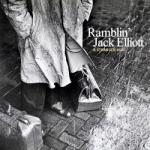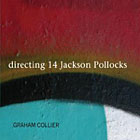Home » Jazz Articles » Album Review » Ramblin' Jack Elliott: A Stranger Here
Ramblin' Jack Elliott: A Stranger Here
Elliott has carried on Woody Guthrie's folk tradition, though the blues has been a part of the singer's songs since his first recordings in the mid-1950s, and he has sung the blues about everything from cocaine to arthritis. Therefore, it wasn't so far-fetched when producer Joe Henry pitched the idea for Elliott to record these songs of drifting, soul-searching, mortality and the cruel vicissitudes of nature.
There's a lovely shuffling New Orleans gait to "Rising High Water Blues," Blind Lemon Jefferson's 1927 classic, and David Piltch's bass has a tuba-deep, second line swing; Elliott's gravely voice intoning: "Children stand there screaming, 'Mama, we ain't got no home...'" still conjures images of Katrina, and jangling piano and mandolin sound like the very water breaking the levees.
Elliot's voice, despite his 78 years, is strong and emotive. On the influential guitarist Reverend Gary Davis' "Death Don't Have no Mercy"—once a staple of Grateful Dead concerts, for whom Elliott played between sets— there's a weathered, soulful quality to Elliott's voice. Although Jerry Garcia's voice had withered towards the end, the similarities are there. Appropriately, there's a naked, soul- laid-bare edge to Elliott's voice on Blind Willie Johnson's "Soul of a Man." Greg Leisz' slide playing is a delight, and percussion, bass and ghostly dobro build powerfully and hypnotically to make this arguably one of the definitive versions of this classic blues.
The lovely country blues of Mississippi John Hurt's "Richland Woman's Blues," Tampa Red's "New Stranger Blues" and Furry Lewis' gorgeous, gently paced "Falling Down Blues" provide contrast to the darker undertones of "Grinnin' in your Face;" Elliott conveys the pain and resignation of Son House's lament, which has the sobering effect of a shovel-full of cold earth on a coffin lid. Somber bass and drums, almost funereal, and mournful piano close the song.
The sensuous slow dance that is Leroy Carr's "How Long Blues" sees Elliott belt out the lines: "If I could holler like a mountain jack I'd go up on the mountain, call my baby back..." over David Hidalgo's swaying accordion. These songs have the feel of a front porch get-together, albeit with impeccable musicianship from the supporting cast.
Nat Hentoff wrote of a young Joan Baez, that she sang centuries-old, English folksongs as convincingly as if she was of that time. The same could be said for Ramblin' Jack Elliott's ability to become the protagonist of the songs he sings.
Elliott has never been a prolific song writer, making Dylan's praise perhaps unduly generous; nevertheless, this is a hugely satisfying recording by a unique figure in American music.
Track Listing
Rising High Water Blues; Death Don't Have No Mercy; Rambler's Blues; Soul of a Man; Richland Women Blues; Grinnin' in your Face; New Stranger Blues; Falling Down Blues; How Long Blues; Please Remember Me.
Personnel
Ramblin' Jack Elliott: vocals, acoustic guitar; Greg Leisz: acoustic guitar, mandolin, mandola, dobro, Weissenborn; David Piltch: upright bass; Jay Bellerose: drums and percussion; Keefus Ciancia: piano, keyboards; David Hidalgo: acoustic guitar, accordion; Van Dyke Parks: piano, vibraphone.
Album information
Title: A Stranger Here | Year Released: 2009 | Record Label: Anti-
Tags
PREVIOUS / NEXT
Support All About Jazz
 All About Jazz has been a pillar of jazz since 1995, championing it as an art form and, more importantly, supporting the musicians who make it. Our enduring commitment has made "AAJ" one of the most culturally important websites of its kind, read by hundreds of thousands of fans, musicians and industry figures every month.
All About Jazz has been a pillar of jazz since 1995, championing it as an art form and, more importantly, supporting the musicians who make it. Our enduring commitment has made "AAJ" one of the most culturally important websites of its kind, read by hundreds of thousands of fans, musicians and industry figures every month.




















